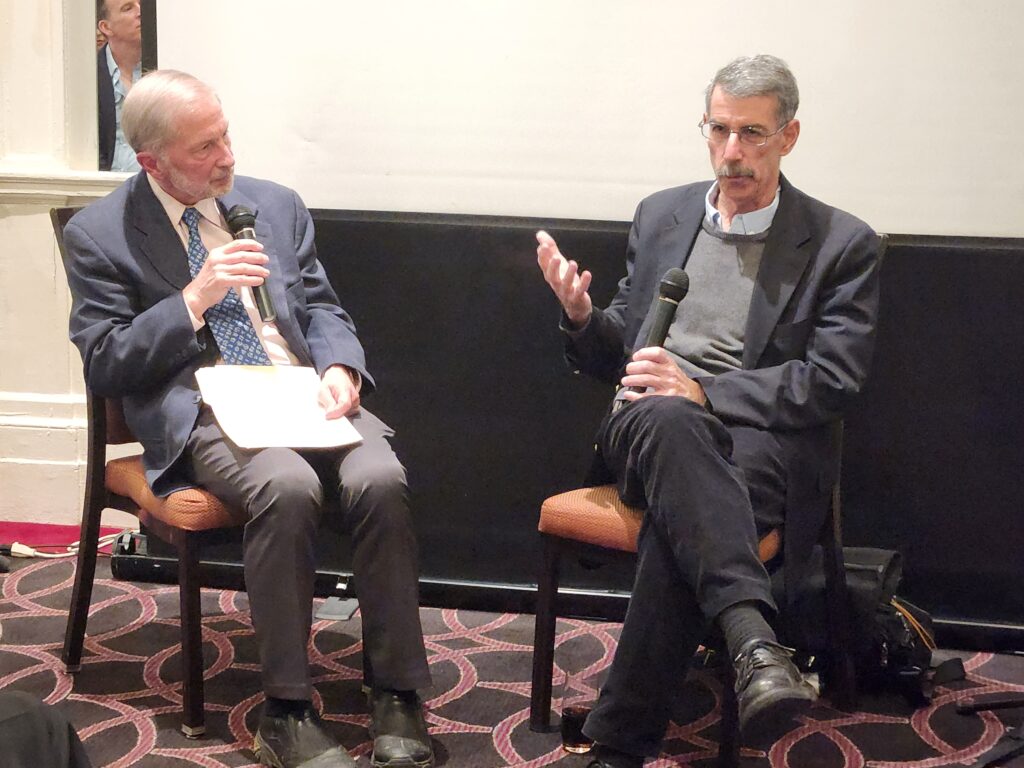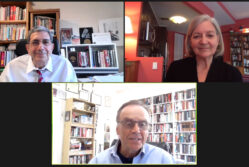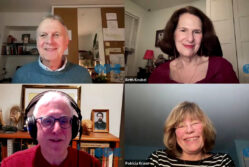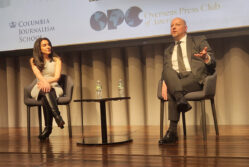Archive Event Highlight

Former CNN Correspondent Mike Chinoy: ‘China Changed’ Under Xi Jinping
 Mike Chinoy, the CNN correspondent who has dedicated 25 years to covering China, including the brutal crackdown on protesters in Tiananmen Square in 1989, defended the American and Western media’s coverage of China despite the Chinese government’s rhetoric that the media is seeking to foment “color revolutions” and topple the Chinese Communist Party.
Mike Chinoy, the CNN correspondent who has dedicated 25 years to covering China, including the brutal crackdown on protesters in Tiananmen Square in 1989, defended the American and Western media’s coverage of China despite the Chinese government’s rhetoric that the media is seeking to foment “color revolutions” and topple the Chinese Communist Party.
Chinoy appeared at an OPC book night on March 23 at Club Quarters, one of the first in-person programs the club has organized since the pandemic broke out. His book, published by Columbia University Press, is entitled, Assignment China: An Oral History of American Journalists in the People’s Republic. The book starts with the Chinese Civil War, quoting OPC longtime members Roy Rowan and Seymour and Audrey Topping. He recounts the media coverage of Tiananmen, the outbreak of Covid in Wuhan, and the expulsion of correspondents for The New York Times, Washington Post and Wall Street Journal in March 2021. In attendance were two correspondents who were forced to flee China following the 2021 expulsions – BBC correspondent John Sudworth and his wife Yvonne Murray, who works for the Irish news organization, RTÉ. They fled China with their three children within 24 hours of learning that they could be targeted for Sudworth’s coverage of Chinese abuses against Uighurs in Xinjiang Province.
The session was moderated by OPC Past President Bill Holstein, who first met Chinoy when Holstein transferred to Hong Kong for United Press International in 1979. Chinoy was already established as a China Hand. Holstein noted that over a period of 30 years, the U.S. media supported China’s admission to the World Trade Organization, argued that China was emerging as a more pluralistic society and believed it would become a “responsible stakeholder” in the world order that the U.S. and its allies created following World War II.
But President Xi Jinping, who first consolidated power in 2012 and 2013, has upended many of those rosy assumptions. As the Western media now portrays him, he has emerged as a hardline Marxist-Leninist who wiped out China’s private sector and imposed draconian social and political controls, seized Hong Kong and crushed its democracy, sought to exterminate the Uighurs in Xinjiang, and supported Russia’s invasion of Ukraine in a direct challenge to the American-led world order.
Holstein asked if this shift in the media’s tone was justified. “We chronicled China’s jointing the WTO,” Chinoy said. “We chronicled what appeared to be steps that might lead to China becoming a responsible shareholder. I don’t think we were advocating it. We were trying to chronicle it. The China that I lived in, in the late 1980s and 1990s following the repression around Tiananmen,was changing [in a positive direction]. We were not making stuff up about this becoming a more open society. It was reflected in the reporting. It was much easier to do. You could go around more readily. It wasn’t that hard to talk to people. But China [under Xi] has really changed.”
Chinoy argued that China’s elite leadership around 2010-2012 became worried about corruption and the overall “rot” in the Chinese system and tapped Xi as leader to start cleaning it up. At one point, voices in the Western media proclaimed that Xi would be a “great reformer,” Chinoy noted.
He said the American media should not be blamed for misreading Xi’s intentions. “It also took people in the Chinese system by surprise,” Chinoy said. “It’s not like we in the Western press missed something that was glaringly obvious. It’s a function of the fact that we just don’t know very much about Xi. We don’t know much about the really elite level politics.”
“In researching the book, what’s striking is that on balance the American press got it right on the broad-brush strokes more often that they got wrong,” Chinoy said. “The broad outlines of the dynamics of the power struggle [over the decades], they got more right than wrong.”
The Chinese government and Communist Party argue that the “global discourse” about China is too negative. Holstein asked Chinoy whether the American media is projecting values it should not be projecting or “are we just doing our jobs?”
“American and Western journalism at its finest has certain values,” Chinoy said. “They come with the craft of journalism – to hold the powerful accountable, to be a voice for the voiceless, to shed a light in dark places that powerful interests may not want exposed. That’s part of democracy – giving people information so that they can make up their own minds and behave accordingly. That’s where we come from. You go to China and you’re going to do the same thing. Anybody who has done this work will realize the notion of a campaign [against the Communist Party] is nonsense,” Chinoy said. “The notion that there is some master plan is just nonsense.”
Assuming the U.S.-Chinese relations continue to deteriorate, Chinoy predicted the Chinese government will seek to make it more difficult for news organizations to cover the country. “They haven’t expelled everybody,” Chinoy noted. “In the past year, they have let in a few [journalists]. The New York Times has two people now whereas for a while it had only one. None of the people who were expelled have been allowed back in or allowed to go to Hong Kong. But they have allowed a few new people in. It’s kind of a paradox.”
“On the one hand, the Chinese leadership wants to see the international order reflect China’s legitimate standing as this great power,” Chinoy said. “On the other hand, they also crave respect and legitimacy. If you’re a serious superpower, you need to have the New York Times there. Otherwise, you’re not a serious superpower. But they want to control it. It doesn’t cost them very much to have one or two [correspondents] there because of the problems the government creates on the ground. The difficulties of getting around are such that they can live with it. It’s no longer possible to do the things that were possible before. The treatment of the press is also a barometer of the relationship. If the relationship goes down, it’s going to get harder for the press. No question.”
The limitations on movements of Western journalists have a negative effect on overall coverage of China, he said. “We don’t really have a sense of the dynamics of the society,” Chinoy said. “Because there isn’t that kind of [on-the-ground] reporting, what does get in the news is Wolf Warrior diplomacy, TikTok hearings and war over Taiwan. It turns the depiction of China into this one-dimensional bad guy.”



